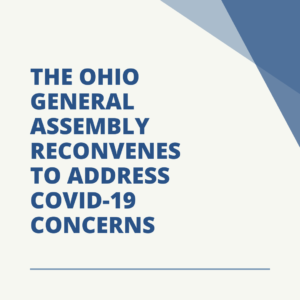On Tuesday, May 5, the Ohio General Assembly reconvened after both chambers last held sessions on March 25. The House Finance Committee was the first to meet as the General Assembly resumed committee work. Both chambers held sessions on Wednesday, May 6 and they aim to keep a regular schedule of session and committees in the coming weeks. Lawmakers have introduced over 50 bills to address issues related to the COVID-19 pandemic. The subjects of these bills range from paid family leave to sales tax on personal protective equipment and easing telehealth restrictions.
On May 6, each chamber passed several bills addressing the pandemic. Senate Bill 310, passed by the Senate, is to distribute $350 million of federal CARES Act funding. Local governments will be able to use these funds for expenses related to the pandemic such as overtime for emergency service workers, personal protective equipment, and disinfectant. The bill is awaiting a House vote.
Another bill passed unanimously by the Senate on Wednesday is Senate Bill 303. The bill addresses pharmacist consult agreements with physicians. The measure expands pharmacists’ ability to enter into these agreements with healthcare providers who work more directly with patients to manage chronic conditions of patients. These providers include advanced practice registered nurses, physician assistants, nurse-midwives, and clinical nurse specialists. In the event of a second wave of COVID-19 infections, this legislation aims to provide additional support to our healthcare system in the event we need all hands on deck. The bill will move to the House for a vote.
Senate Bill 1 was amended and passed in the House. The focus of the bill is to reduce regulatory barriers for occupational licensing. Before passage, an additional amendment was added that would limit any order issued by the state health director to fourteen days. The legislative Joint Committee on Agency Rule Review (JCARR) would need to approve any extension of these orders before they expire. If they do not meet, the order would be rescinded. The amended bill still needs to be voted on by the Senate.
The House also passed an amended Senate Bill 55 which aims to enhance penalties for drug offenses near addiction service providers. The amendment would prohibit criminal penalties for Department of Health or local health department orders. The penalties for violating orders would be a maximum fine of $150 for state order violations and a maximum fine of $100 for violating a local order. The Senate has not yet voted on the amended bill.
The Senate Judiciary Committee heard Senate Bill 301 and Senate Bill 308 for the first time on Wednesday. SB 301 is regarding penalties for price gouging and hoarding during declared emergencies or disasters while SB 308 aims to limit civil liability during these times. These bills will need to be passed out of the committee before they go to the Senate floor for a vote.
Moving forward, the House and Senate aim to continue conducting regular sessions and committees each week.

